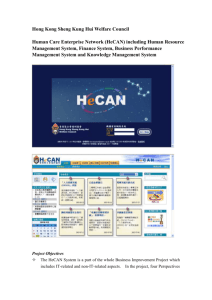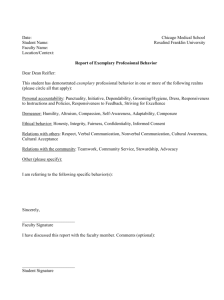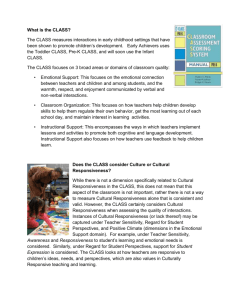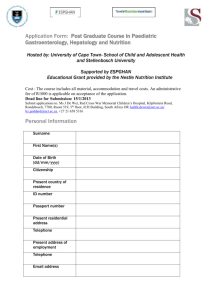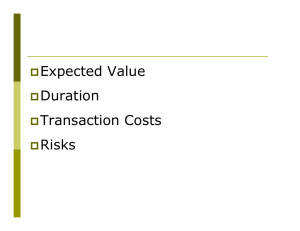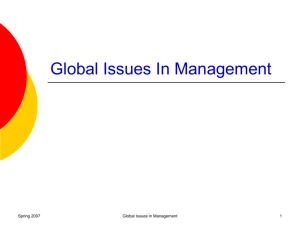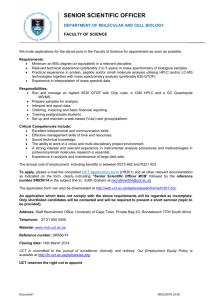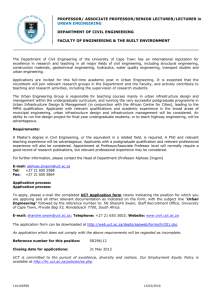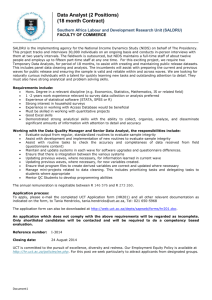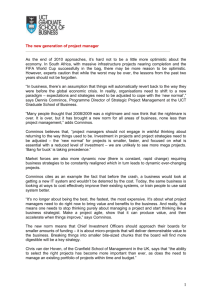In Search of Service Learning - Social Responsiveness
advertisement
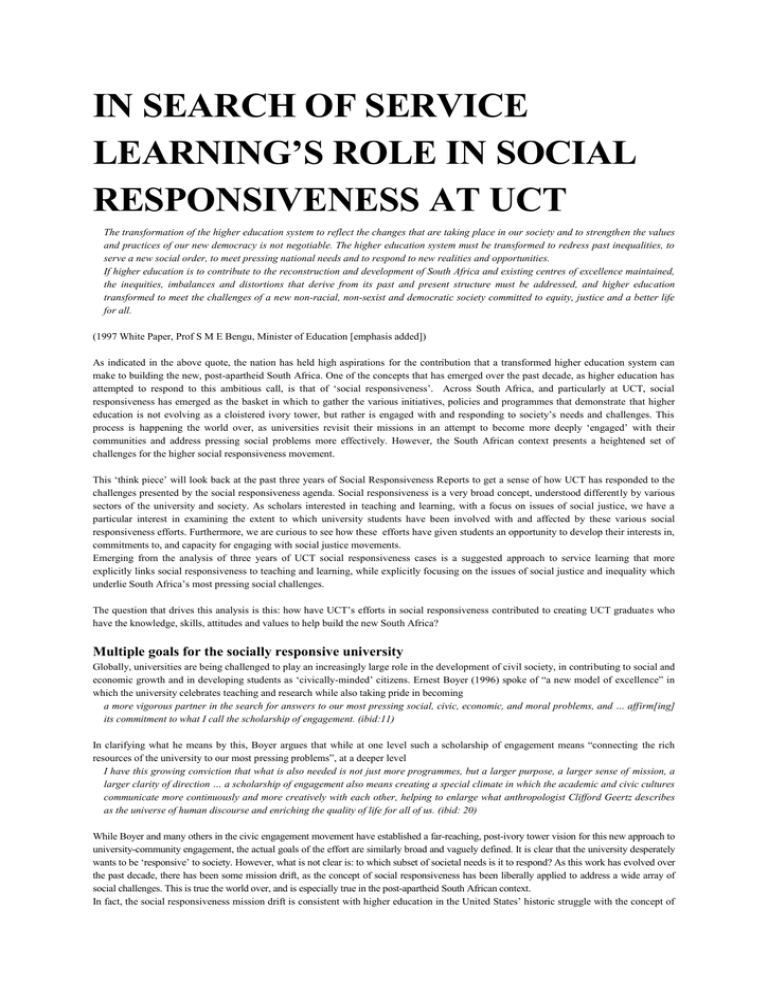
IN SEARCH OF SERVICE LEARNING’S ROLE IN SOCIAL RESPONSIVENESS AT UCT The transformation of the higher education system to reflect the changes that are taking place in our society and to strengthen the values and practices of our new democracy is not negotiable. The higher education system must be transformed to redress past inequalities, to serve a new social order, to meet pressing national needs and to respond to new realities and opportunities. If higher education is to contribute to the reconstruction and development of South Africa and existing centres of excellence maintained, the inequities, imbalances and distortions that derive from its past and present structure must be addressed, and higher education transformed to meet the challenges of a new non-racial, non-sexist and democratic society committed to equity, justice and a better life for all. (1997 White Paper, Prof S M E Bengu, Minister of Education [emphasis added]) As indicated in the above quote, the nation has held high aspirations for the contribution that a transformed higher education system can make to building the new, post-apartheid South Africa. One of the concepts that has emerged over the past decade, as higher education has attempted to respond to this ambitious call, is that of ‘social responsiveness’. Across South Africa, and particularly at UCT, social responsiveness has emerged as the basket in which to gather the various initiatives, policies and programmes that demonstrate that higher education is not evolving as a cloistered ivory tower, but rather is engaged with and responding to society’s needs and challenges. This process is happening the world over, as universities revisit their missions in an attempt to become more deeply ‘engaged’ with their communities and address pressing social problems more effectively. However, the South African context presents a heightened set of challenges for the higher social responsiveness movement. This ‘think piece’ will look back at the past three years of Social Responsiveness Reports to get a sense of how UCT has responded to the challenges presented by the social responsiveness agenda. Social responsiveness is a very broad concept, understood differently by various sectors of the university and society. As scholars interested in teaching and learning, with a focus on issues of social justice, we have a particular interest in examining the extent to which university students have been involved with and affected by these various social responsiveness efforts. Furthermore, we are curious to see how these efforts have given students an opportunity to develop their interests in, commitments to, and capacity for engaging with social justice movements. Emerging from the analysis of three years of UCT social responsiveness cases is a suggested approach to service learning that more explicitly links social responsiveness to teaching and learning, while explicitly focusing on the issues of social justice and inequality which underlie South Africa’s most pressing social challenges. The question that drives this analysis is this: how have UCT’s efforts in social responsiveness contributed to creating UCT graduates who have the knowledge, skills, attitudes and values to help build the new South Africa? Multiple goals for the socially responsive university Globally, universities are being challenged to play an increasingly large role in the development of civil society, in contributing to social and economic growth and in developing students as ‘civically-minded’ citizens. Ernest Boyer (1996) spoke of “a new model of excellence” in which the university celebrates teaching and research while also taking pride in becoming a more vigorous partner in the search for answers to our most pressing social, civic, economic, and moral problems, and … affirm[ing] its commitment to what I call the scholarship of engagement. (ibid:11) In clarifying what he means by this, Boyer argues that while at one level such a scholarship of engagement means “connecting the rich resources of the university to our most pressing problems”, at a deeper level I have this growing conviction that what is also needed is not just more programmes, but a larger purpose, a larger sense of mission, a larger clarity of direction … a scholarship of engagement also means creating a special climate in which the academic and civic cultures communicate more continuously and more creatively with each other, helping to enlarge what anthropologist Clifford Geertz describes as the universe of human discourse and enriching the quality of life for all of us. (ibid: 20) While Boyer and many others in the civic engagement movement have established a far-reaching, post-ivory tower vision for this new approach to university-community engagement, the actual goals of the effort are similarly broad and vaguely defined. It is clear that the university desperately wants to be ‘responsive’ to society. However, what is not clear is: to which subset of societal needs is it to respond? As this work has evolved over the past decade, there has been some mission drift, as the concept of social responsiveness has been liberally applied to address a wide array of social challenges. This is true the world over, and is especially true in the post-apartheid South African context. In fact, the social responsiveness mission drift is consistent with higher education in the United States’ historic struggle with the concept of ‘service’. Lauded along with teaching and research as the ‘third leg’ of the American higher education stool, service is a concept that has been fraught with confusion and interpreted differently by various types of higher educational institutions (Pollack, 1999). Traditionally, the struggle breaks down into four different ways in which higher education sees itself as fulfilling its service (or social responsiveness) mission. These are: 1. Expanding opportunity for higher education to historically underserved groups; 2. Addressing society’s labour market needs, especially for quality professionals; 3. Developing and applying new knowledge to address pressing social problems; and 4. Training and forming the character of a nation’s citizens and leaders. In our current South African context, the search for social responsiveness has embraced each of these four aspects. In fact, these same four concepts are clearly outlined in the 1997 White Paper, which identifies the following as the four purposes of higher education in the new South Africa: • To meet the learning needs and aspirations of individuals through the development of their intellectual abilities and aptitudes throughout their lives. (EXPANDING OPPORTUNITY) • To address the development needs of society and provide the labour market, in a knowledge-driven and knowledge-dependent society, with the ever-changing high-level competencies and expertise necessary for the growth and prosperity of a modern economy. (LABOUR MARKET) • To contribute to the creation, sharing and evaluation of knowledge. Higher education engages in the pursuit of academic scholarship and intellectual inquiry in all fields of human understanding, through research, learning and teaching. (NEW KNOWLEDGE) • To contribute to the socialisation of enlightened, responsible and constructively critical citizens. Higher education encourages the development of a reflective capacity and a willingness to review and renew prevailing ideas, policies and practices based on a commitment to the common good. (FORMING CHARACTER) Taken individually, each dimension of social responsiveness makes a compelling case for the university’s attention and resources. However, resources are limited. To which of these pressing societal needs is higher education in South Africa (and UCT in particular) to respond? How has UCT’s practice over the past decade evolved in the face of these competing approaches to social responsiveness? To what extent has the university itself been transformed by this new focus on social responsiveness? What kinds of efforts have emerged due to their synergy with UCT’s traditional mission and stature as an elite research university? How have these efforts become integrated with the university’s core mission of teaching & learning? In other words, are we graduating more ‘socially responsive’ students? And if so, to which societal segments and issues are they able to respond most effectively? These are some of the questions that launched us into a review of the past three years of UCT’s work in social responsiveness, captured in the Social Responsiveness Reports from 2005 to 2007. Emergence of UCT’s focus on Social Responsiveness Since 2003/2004, UCT – largely through the Institutional Planning Department (IPD) – has worked to develop an appropriate institutional understanding and project in the broad area of societal engagement. Similar efforts were under way at other South African higher education institutions, sparked by the CHESP programme (Community-Higher Education-Service Partnership) which had been promoting service learning as an approach to building connections between higher education, service delivery systems, and communities since 1999. CHESP was sponsored by the Joint Education Trust (JET) and the Ford Foundation, and though it focused particularly on service learning, it created a certain national momentum around the issue of engagement. One of the first initiatives to emerge at UCT under IPD’s leadership was a 2003/2004 campus-wide effort to identify the different ways in which UCT was involved in community projects, broadly speaking. As a result of this process and through much debate on campus, the term ‘social responsiveness’ was adopted as the preferred term for this work. This led to the formation of the Social Responsiveness Working Group, which towards the end of 2008 became formally recognised as the University Social Responsiveness Committee (USRC). In addition, UCT Council adopted the university Social Responsiveness Policy in November 2008, creating a policy framework to guide work in this area. The policy document was aimed at providing support for social responsiveness in teaching and learning, research and community service (mainly student volunteerism), and at aligning incentives with these new role expectations for academic staff. Analysis of UCT practice:Social Responsiveness Reports (2005-2007) In 2005 IPD began the annual process of producing the UCT Social Responsiveness Report. Planned as a way to encourage social responsiveness as well as a way to acknowledge teaching, research and voluntary service work across campus, these reports have been written up annually as ‘portraits of practice’ (Stanton, 2000). Beginning in 2006, each year the Deans in each Faculty have nominated specific cases for the report, and the final decision of which to include has been made by the USRC. From 2005 to 2007 the Social Responsive Reports have documented 38 cases or portraits of best practice. As researchers, we decided to use these cases as sources of data. Our goal was to inductively develop a ‘taxonomy’ that might explicate how UCT has come to understand social responsiveness. In other words, through analyzing the ‘portraits of best practice’ that the university itself had identified, we might gain insight into how the university was coming to understand the concept of social responsiveness. Rather than creating categories in advance, we used an inductive approach to data analysis, and let the categories emerge from the details and approaches to responsiveness provided by the cases themselves. We were guided by the USRC’s own broad-based understanding of social responsiveness, which acknowledged a variety of approaches, all linked to the core missions of teaching and research (Social Responsiveness Report, 2005: 5). Consistent with the core mission of higher education, emerging from this inductive approach was a ‘Taxonomy of Forms of Responsiveness’ that included three main categories: 1) Research-oriented Forms of Responsiveness; 2) Teaching Learning-Oriented Forms of Responsiveness; and 3) Direct Engagement. Further analysis revealed that there were noteworthy distinctions within each of these three major categories, revealing eight different forms of responsiveness. These differences concerned both the audiences of the work and its major orientation. In the research category, for instance, some work was developed as applied research to address a specific issue, or the target audience for disseminating results was wider than the traditional academic audience. Within the teaching and learning category, forms of responsiveness were aimed at the curriculum and knowledge content, or at developing social justice-oriented graduates, or at widening access to non-traditional constituencies. Within the direct engagement category, ultimately we decided to focus solely on student projects, mostly of a voluntary nature. Initially we included staff projects as well, those in which academic staff were using their skills to address needs in society. However, we finally settled on staff projects being a form of researchoriented engagement, rather than just direct service provision. This enabled us to separate them from students’ engagements. Once the categories had emerged, we re-read each of the cases to determine which form of responsiveness was evidenced by the case. Recognising that the cases were often multi-dimensional, each project was coded with a designation for a ‘major emphasis’ and as many ‘secondary emphases’ as was deemed appropriate. Ultimately, after all 38 cases were analysed, we were able to get a sense of the taxonomic distribution of the cases. Insights from Analysis of Social Responsiveness Cases The patterns that are revealed from this analysis of social responsiveness at UCT are striking. We would like to address three observations briefly: 1)Research-oriented forms pre-dominate; 2) There is a limited link to teaching and learning; and, 3) There is even less of a focus on student learning about social justice and social responsibility. Research-oriented forms pre-dominate. First, it is clear that the dominant emphasis has been on research-oriented forms of responsiveness, with 24 of the 38 cases (64%) fitting into the four research-oriented categories. Given UCT’s role as South Africa’s leading research university, this finding is not at all surprising. However, there is a wide array of ‘recipients’ of these research efforts, ranging from industry (Motor Industry Development Programme – 2005) to government policy-makers (South African Labour and Development Research Unit – 2006) to marginalised communities (Health and Human Rights Project – 2007).Clearly, UCT’s research efforts are responsive to a very wide swatch of societal needs. While there are many different categories of recipients for these research findings, it was still our finding that a more narrow and limiting definition of what was recognised as ‘valid, scholarly’ research is used in most instances. This means that on the whole, forms of community-based research are not recognised in the same way as more traditional research for promotion and funding purposes. Limited link to teaching and learning. Perhaps a bit more surprising was the limited link to teaching and learning to be found in the various cases. While there were seven cases involving students providing direct service to historically marginalised communities, these projects included virtually no opportunity for students to engage in learning about their community work. This is understandable, in that a number of these projects involved student groups working outside the formal curriculum (Inkanyezi – 2007; and Masizikhulise – 2007). However, even the cases that had a link to the formal curriculum had a very limited connection to student learning. Students were involved in community projects in which they could apply the knowledge base of their field to real-world contexts, but had little formal opportunity to draw lessons from these experiential learning contexts (Community Service in Law – 2005; Simulated Architectural Practice – 2006; Info Science Honours Outreach and Community Involvement – 2007). Reflection on experience is the driver for learning in all experiential learning processes, including service learning (Kolb, 1984). Taxonomy of Forms of Responsiveness 2005-2007 (Table 1)# of Cases Research-Oriented Forms of Responsiveness 1. Applied research responsive to societal needs. 2. Research results disseminated to a broader society. 3. Research informing public bodies, commissions, and policy processes. 4. Academic staff knowledge and skills brought to address societal needs. Teaching & Learning-Oriented Forms of Responsiveness 5. Teaching and learning to develop socially responsive graduates. 6. Making the curriculum (and academia) more relevant to society. 7. Making education available to wider society (continuing and community-based education). Direct Engagement 8. Students providing direct services to meet societal needs. (24 cases) 7 4 6 7 (7 cases) 3 3 1 (7 cases) 7 Unfortunately, the efforts that did involve students in active engagement failed to close the learning loop in most cases. Even less of a focus on social justice and social responsibility for students. Most surprising of all was the recognition that in the seven cases where there was a direct link to teaching and learning, there was very little intentional focus on issues of social justice, or on cultivating students’ sense of social responsibility. Only 3 of the 38 social responsiveness cases (8%) focused directly on facilitating student learning about inequality and social justice as a core component of their work in responsiveness (Urban Geography – 2005; Child Guidance Clinic – 2006; Positive Beadwork – 2006).The other cases that involved teaching and learning as a primary emphasis focused on expanding the curriculum, or on providing access to higher education for non-traditional students. Educating Socially Responsive and Social Justice-Oriented Students Clearly, there is no shortage of societal needs and challenges to which UCT as Africa’s premier research university is being called on to respond. The 38 cases featured in the Social Responsiveness Reports from 2005 to 2007 provide a rich display of concrete ways in which UCT is responding to many of the challenges confronting South African society. However, despite this richness, we are struck at the limited connection that has evolved until this point between UCT’s academic programs, their curricula, and the underlying issues of inequality and social justice that remain a challenge in 21st century South African society. While progress has been made on many aspects of the social responsiveness front, we see very few examples of UCT students developing the knowledge, skills and values to build “…a new non-racial, non-sexist and democratic society committed to equity, justice and a better life for all” (White Paper, 1997). For a variety of reasons, UCT has developed a very robust portfolio of social responsiveness, yet student learning about inequality and social justice, arguably the cornerstone of the entire social responsiveness agenda, has been left behind. Students are engaging in a variety of ‘service activities’ with historically marginalised communities. They are participating in co-curricular projects organised by student groups such as SHAWCO or Ubunye. They are also providing service to marginalised communities through courses in Law, Sociology, Geography, Construction Management, Information Science, and many others. However, despite this responsive engagement, we have not developed the teaching and learning practices to help students become “multicultural community builders: students who have the knowledge, skills and attitudes to work effectively in a diverse society to create more just and equitable workplaces, communities and social institutions (CSU Monterey Bay, http://service.csumb.edu/site/x4156.xml). One of our goals must be to enrich UCT’s work in area #5 of the Taxonomy of Forms of Responsiveness: “teaching and learning to develop socially responsive graduates”. A new approach to service learning can help us accomplish that goal. A New Perspective on Service Learning: Linking Engagement, Teaching and Learning, and Social Justice Service learning is widely understood to be an educational practice that links formal academic learning with the process of addressing realworld, community-identified needs. As mentioned above, formal reflection on experience is understood to be the process that is driving student learning through students’ work in service. However, as service learning has become established in higher education, there has been an overemphasis on students’ acquisition of discipline-based knowledge through their community work, and a lack of emphasis on students developing their understanding of social justice and capacities for social responsiveness (Cordero de Noriega and Pollack, 2006). This has also been the case with the evolution of service learning in South Africa through the CHESP Programme, which tended to emphasise a rather narrow, one-size-fits-all, discipline-based learning. This resulted in “a strong negative reaction at some institutions … [which] are generally reclaiming the contested concept and labelling service-learning with their own terminology or saying that they will do servicelearning in their own way” (Mouton & Wilschut, in Hall 2010: 30). One of the reasons for this reaction, argues Hall, is that “there is a troubling ambiguity concerning even basic principles and goals in the service-learning literature” (Butin, 2003, cited in Hall 2010: 31) This is supported by our work here at UCT. The UCT case studies clearly demonstrate that merely connecting academic courses to service projects in a historically marginalised community does not necessarily bring about transformative learning; or, for that matter, transformative service. What is needed is a more explicit educational practice that connects community engagement, teaching and learning, and social justice. For us, this would be a re-defined, social justice-oriented approach to service learning. In thinking anew about service learning, it is therefore useful to unpack the questions and assumptions behind the practice. At the core of our thinking have been the following questions and values. What do students need to know, be able to do, and care about to help to build the new South Africa? This questions taps into issues of ‘student graduateness’ or ‘graduate attributes’, but locates the issue within a very specific and local South African context. If we are considering the ways in which universities can play a more meaningful role in broader society, then we need to ask about the role of students within this, and therefore identify the knowledge, skills, values and attitudes we want our students to reflect as a dimension of the knowledge of their particular course of study. We also must see where in our curricula students have the opportunity to develop these new skills, knowledge and attitudes. What are the new knowledge sources that emerge from partnering with historically marginalised communities? In order to better understand the broader social context, we need to develop ways in which universities can work more closely with local communities. This helps to develop “transaction spaces” (Gibbons, 2005) which can serve to recognise and value knowledge developed not only in the university context, but in broader contexts as well. Such partnerships can provide the framework for interrogating ways of knowing, and open up possibilities for new knowledge that doesn’t necessarily forgo disciplinary knowledge, but promotes more heterogeneous knowledge forms produced in more diverse contexts. What concepts and language do we need to communicate effectively about injustice and inequity in our society? This is especially relevant when we are discussing our partnerships with historically marginalised communities. Our history of separateness still haunts us, and so we must find ways to speak about the past and present in order to build a different future. How can we listen and learn from each other as we seek to address such complex social issues? What challenges does this pose for teaching and learning? We have provided a diagrammatic representation of our framework that connects these three questions (see Figure 1). In essence it reflects the fact that any teaching and learning intervention is located at the nexus of knowledge, (the ‘what’), context (the ‘where’), and a set of teaching and learning practices (the ‘how’). This is no different in the case of service learning. However, we are specifying that service learning is therefore a particular practice (community-based teaching and learning), that is based on a particular knowledge-set (curricula that address social injustice and inequality), in a particular context (historically marginalised communities). Adopting a more explicitly social justice orientation to our work in service learning brings up a number of important concerns for each of these areas. These are briefly outlined below: • Knowledge: Curricula that address social injustice and inequality o We need to build into our curricula the space to explore social justice issues, eg inequality and poverty, North-South relations, and diversity and transformation; and the ability to think critically about them in both the South African context and the global context. o While this may be harder in some courses and disciplines than in others, we need to do this to assist students in making sense of a very complex learner role in service learning, and very complex contexts in which this service learning is taking place. o As part of the framework, what this does in terms of knowledge is provide an opportunity for curriculum responsiveness, ie curricula that reflect some of the realities of the South African context. However, it does not yet address contexts and new practices. • Context: Historically marginalised communities o In the case we are making for service learning, we need to provide an opportunity for students to learn within contexts that can provide them with as ‘authentic’ a learning opportunity as possible; an example of this includes learning in the contexts that reflect many of the issues discussed above. o This in turn means shifting the learning context away from the classroom to less traditional contexts (eg marginalised communities, NGOs) so that students can begin to understand that knowledge resides in many different places, the university being only one such place. o However, we still need to think about teaching and learning practices that reflect new knowledge and contexts. • Practice: Community-based teaching and learning o One of the features of experiential learning is that students learn through linking theory and practice, with the experience dimension being extremely important and a shift from more traditional paradigms of teaching and learning in South Africa. o Building on this, and facilitating opportunities for linking with new forms of knowledge generated in non-traditional university contexts, implies locating our educational practice within a partnership or engagement with an outside community; teaching and learning then begins from this base. o This in turn implies thinking through the (potentially new) roles (learner and educator) involved in such a process, in the designing of the curriculum (including student assessment) and in evaluation – from both the university partner and the community partner. o If all of this is framed by issues of social justice, as we have argued for in this piece, then we believe we would be developing our practices in the context of ensuring mutual benefit as well as critical analysis of social issues, eg inequality and diversity. Conclusion This think-piece has developed an argument for the importance of transforming teaching and learning practices in higher education so that they reflect the realities within which these practices are located. This is especially important if we want to develop social responsiveness practices in partnership with our historically marginalised communities. Unlike partnerships with industry or government, these social justice-oriented partnerships with communities require more bridge-building and boundary-spanning to be effective (McMillan, 2008). We developed the argument in the following way. By looking at UCT’s social responsiveness project over a three-year period and analysing the case studies, a taxonomy of forms of social responsiveness was developed. This in turn highlighted the fact that there are few teaching and learning social responsiveness projects represented in the report. By highlighting service learning as one way to shift teaching and learning, and by developing an understanding of this practice that links it to issues of social justice and new forms of knowledge (lying outside the university), it becomes clear that introducing new forms of teaching and learning practice is an enormous challenge. Because of such challenges, we believe it is important to pay special attention to the roles of higher education educators as ‘boundary workers’ (McMillan, 2008) at the intersection of higher education and our broader communities: What is/are the knowledge, values, attitudes and authority required to play this role of boundary worker successfully? What are the challenges in playing this role? Finally, developing new practices requires the will and commitment not only of individual academics, but of the institution as well. UCT needs to see a curricular focus on social justice and a prioritisation of partnerships with our more marginalised communities as critical to the education of its students, as well as to the role of the university as a public, well-funded institution in a very divided and unequal South African context. We hope this paper has provided some thoughts and ideas that will contribute to such a process of curricular and institutional transformation. This reflective piece was provided by Dr Janice McMillan of the Centre for Higher Education, and Dr Seth Pollack of the California State University, Monterey Bay, USA. CITATIONS: Boyer, E. (1996) Boyer, E. (1996) The scholarship of engagement. Journal of Public Service and Outreach 9 (1), 11-20. California State University, Monterey Bay. ’Multicultural Community Builder’. http://service.csumb.edu/site/x4156.xml. Cordero De Noriega, Dianne and Seth Pollack (2006). ‘Service Learning at CSUMB: Civic Learning Across the Curriculum”, Special 20th Anniversary Publication, Campus Compact, Providence, RI. http://www.compact.org/20th/read/civic_learning_across_the_curriculum. Department of Education (DoE) (1997), Education White Paper #3: A programme for the transformation of South African higher education, Government Gazette 386 (18207), no. 15. Gibbons, M. (2005). ‘Engagement with the community: The emergence of a new social contract between society and science’, paper presented at the Griffith University Community Engagement Workshop, South Bank campus, Queensland, Friday 4 March. Hall, M. (2010). Community engagement in South African higher education. In Community engagement in South African higher education, South African Council on Higher Education, (CHE), Kagisano Paper No 6. Kolb, D.A. (1984). Experiential learning: experience as the source of learning and development. Englewood Cliffs, NJ: Prentice-Hall. McMillan, J. (2008). ‘What happens when the university meets the community? An analysis of service learning as “boundary work” in higher education’, unpublished PhD thesis, Department of Sociology, Faculty of Humanities, University of Cape Town. Pollack, Seth (1996). ‘Higher Education’s Contested Service Role: A Framework for Analysis and Historical Survey’, in Stanton, Timothy K. To Strengthen Service-Learning Policy and Practice: Stories from the Field, Interim Report from a Service-Learning History Project, Stanford, CA: Haas Center for Public Service. Pollack, Seth (1999). ‘Early Connections Between Service and Education’, in Stanton, Timothy K, Nadinne Cruz and Dwight Giles, Service Learning: A Movement’s Pioneers Reflect on its Origins, Practice and Future, San Francisco, CA: Jossey Bass. Stanton, T. (2000). Bringing reciprocity to service-learning research and practice. Michigan Journal of Community Service Learning Special Fall, 119-123. UCT Social Responsiveness Report (2005), Department of Institutional Planning, University of Cape Town. UCT Social Responsiveness Report (2006), Department of Institutional Planning, University of Cape Town. UCT Social Responsiveness Report (2007), Department of Institutional Planning, University of Cape Town.
